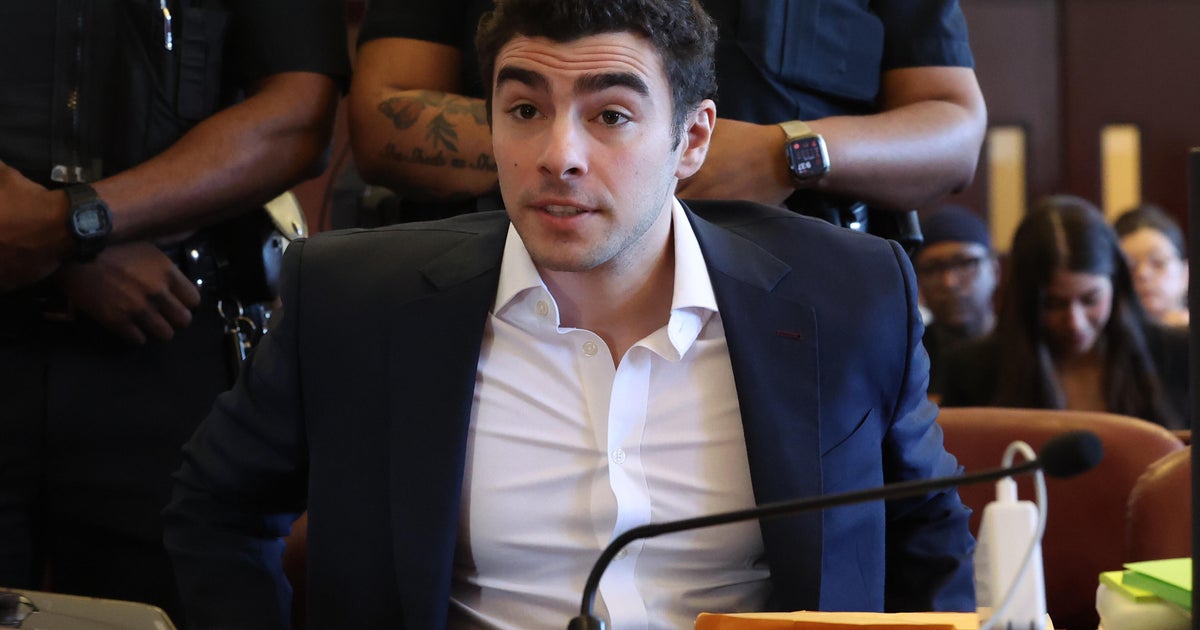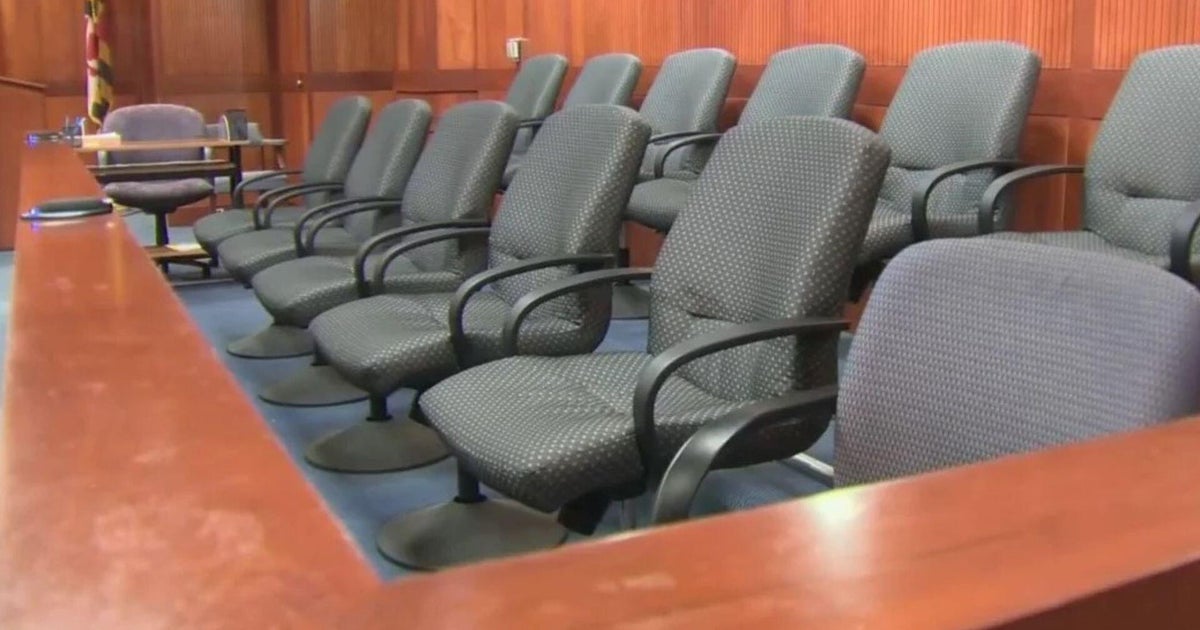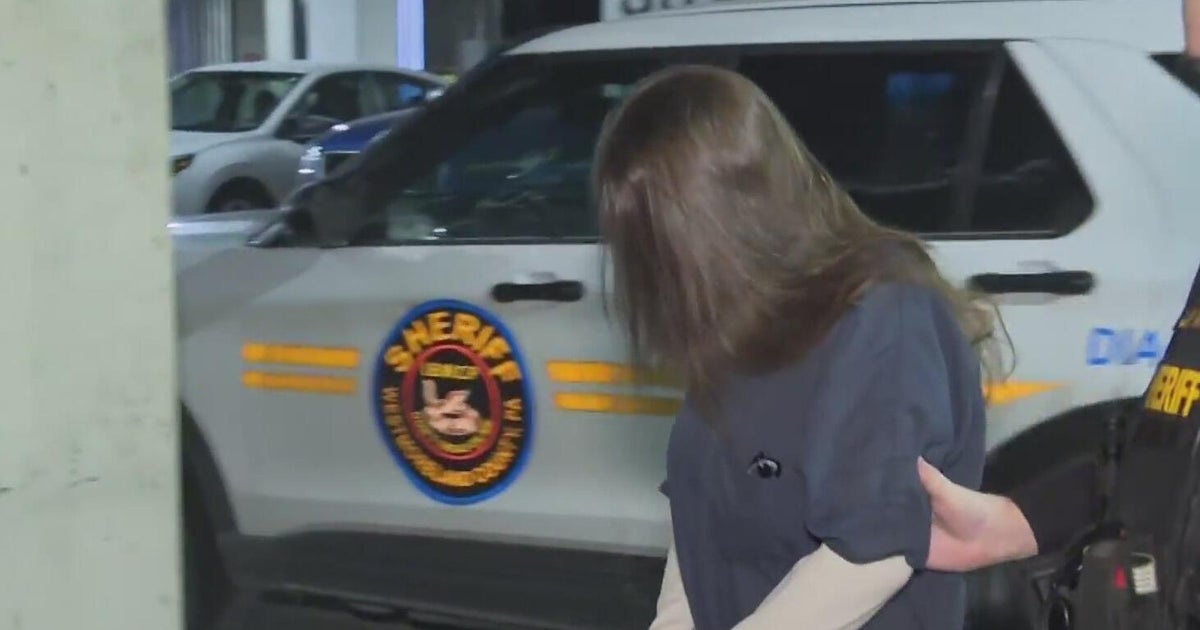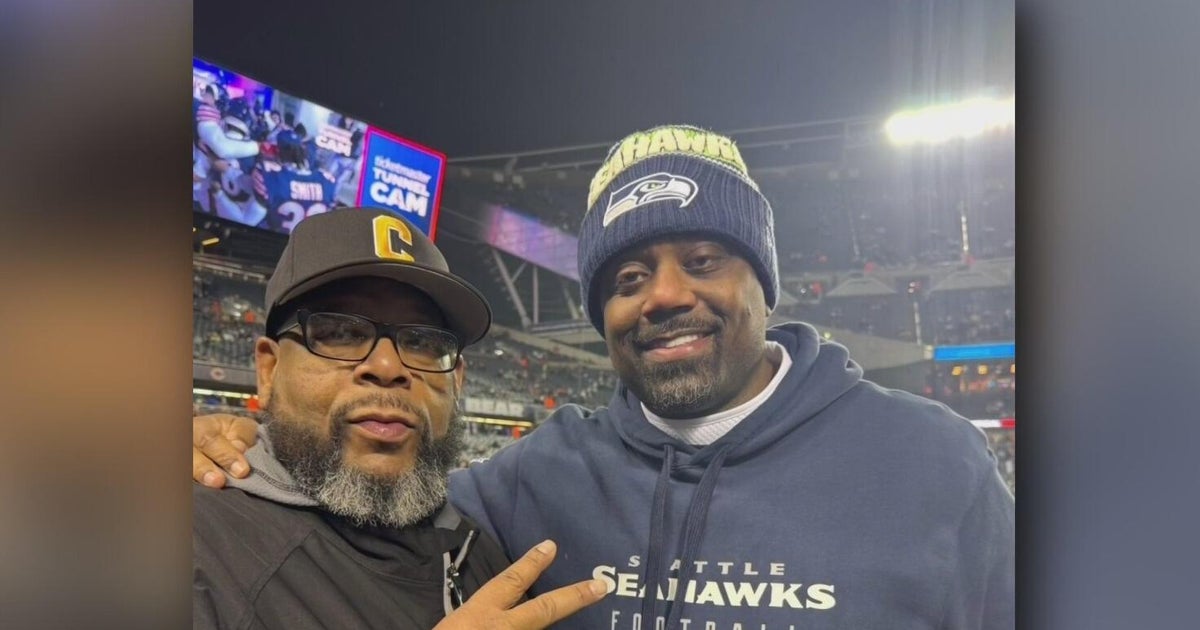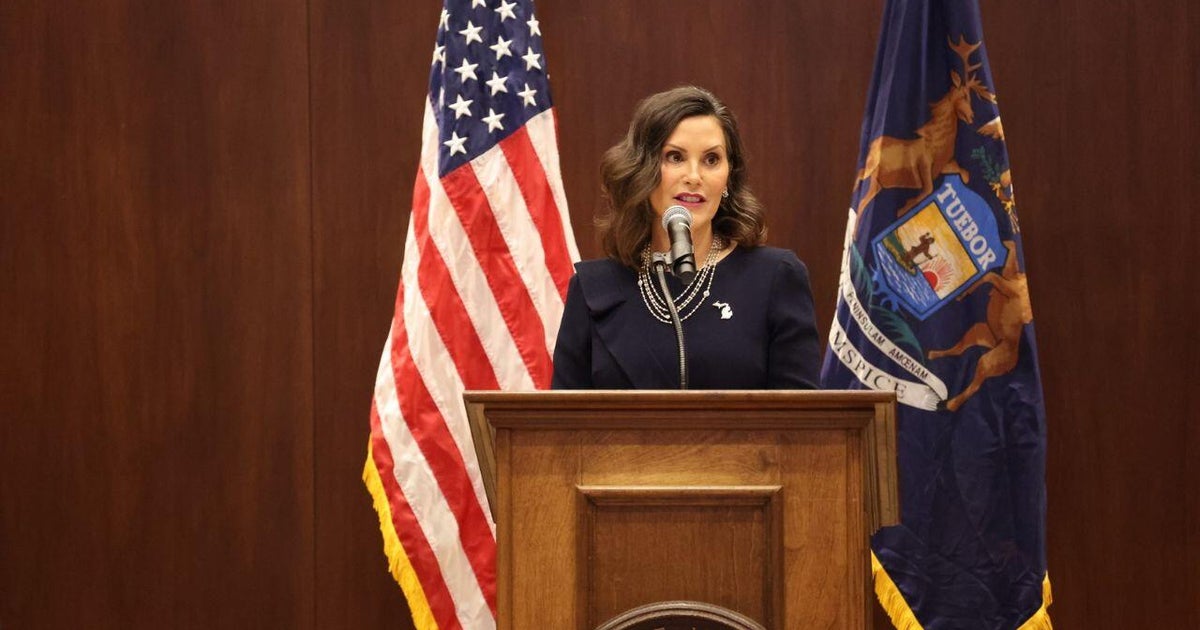Blagojevich Takes Stand In His Own Defense
Updated 05/26/11 – 5:20 p.m.
CHICAGO (CBS) -- Rod Blagojevich has begun defending himself against various shakedown allegations at his corruption retrial, although it took him a few hours to begin directly addressing the charges against him on Thursday.
The former governor took the stand in his own defense on Thursday, something he declined to do at his first trial last summer.
Blagojevich, 54, has pleaded innocent to 20 federal corruption charges, including allegations that he tried to sell or trade an appointment to the U.S. Senate seat vacated by President Barack Obama. At his first trial, jurors deadlocked on all but one count against him, lying to the FBI.
But instead of diving right into the allegations against him, Blagojevich spent his first few hours on the stand talking in great detail about his childhood, parents, hobbies, college years and early professional career.
When defense attorneys began questioning him about the shakedown allegations against him, Blagojevich vehemently denied trying to trade official actions for campaign cash.
One of the allegations against him is that he held up a $2 million grant for the Chicago Academy in 2006 because he was trying to get then-Congressman Rahm Emanuel to hold a fundraiser, or to have his brother, Hollywood agent Ari Emanuel, hold one.
Blagojevich acknowledged that Emanuel had asked him to approve a grant for a school in his district and that he agreed to provide the money, but testified that it wasn't a priority for him.
He said he couldn't even remember the name of the school involved in the grant until several months later when his chief of staff, John Harris, informed him of a problem with the grant.
Blagojevich claimed he told Harris, "I approved a grant a long time ago, I thought he got the money."
Earlier in the trial, Blagojevich's former deputy governor, Bradley Tusk, had testified that Blagojevich asked him to hold up the grant because he wanted Emanuel to convince his brother to hold a fundraiser first.
But Blagojevich denied ever saying that to Tusk.
"Did you ever hold up the Chicago Academy school grant in order to get campaign contributions?" Goldstein asked. Blagojevich said no.
"Did you ever hold up that grant?" Goldstein asked. Blagojevich again said no.
"Did you try and get campaign contributions in exchange for that school grant?" Goldstein asked. Blagojevich said no.
But Blagojevich did concede that he wanted Ari Emanuel to hold a fundraiser for him, but said it had nothing to do with the school grant. Blagojevich said he'd attended a fundraiser that Ari Emanuel held for his brother in 2006, so he thought Ari Emanuel might be willing to do the same for him, since he and Congressman Emanuel were political allies.
But the Emanuels never held any fundraiser for Blagojevich.
Blagojevich and other witnesses have testified that the school eventually got its money in pieces as bills came in for a football field it was building with the grant money.
Later, Blagojevich also denied the allegation that he was trying to squeeze racetrack owner John Johnston for $100,000 in campaign cash in exchange for signing legislation that would require Illinois casinos to pay financial subsidies to the horse racing industry.
Goldstein asked Blagojevich if he ever held up the racetrack legislation in exchange for a contribution from Johnston.
Blagojevich emphatically said no.
Instead, Blagojevich painted the Johnston family as major political players who had helped him out for years and were used to giving money to the governor's campaign and raising money from others on Blagojevich's behalf.
"They were big supporters and very helpful to my campaigns," Blagojevich said.
He recalled how Johnston held a fundraiser for his first bid for governor at Yankee Stadium in 2002, noting that Johnston was a business partner of late Yankees owner George Steinbrenner. He also mentioned that billionaire Donald Trump and talk show host Regis Philbin attended the Johnston fundraiser.
Blagojevich Denies Jackson's Allegations
Blagojevich also disputed an allegation levied by Congressman Jesse Jackson Jr., who took the stand as the first defense witness on Wednesday.
Even though Jackson testified as part of the defense case on Wednesday, he said Blagojevich once hinted that he didn't give Jackson's wife a job running the Illinois Lottery because Jackson had declined to give the Blagojevich campaign a $25,000 contribution.
Jackson said that, during Blagojevich's 2002 run for governor, former U.S. Rep. Bill Lipinski asked him to give $25,000 to Blagojevich's campaign, but Jackson refused. Then, after Blagojevich took office, Jackson tried to help his wife get a job as Illinois Lottery director, but the job eventually went to someone else.
Six months later, in Washington, D.C., Blagojevich was meeting with several congressman and, as he left a meeting with Jackson, Blagojevich turned and, according to Jackson, "In classic Elvis Presley fashion, he snapped both fingers and said 'You should have given me that $25,000."
But Blagojevich said he never asked Jackson for a campaign contribution.
"I don't remember anything remotely like that," Blagojevich said of Jackson's account.
According to Blagojevich, he and Jackson became close friends while serving together in the U.S. House.
"I really liked Jesse Jackson Jr. in the beginning. … He was a rising star, a young new congressman," Blagojevich said. "I really liked him and felt that he was a lot of fun. … I saw him as, frankly, Barack Obama – that Jesse Jr. had the potential to be what Barack Obama came to be."
Jackson's allegation about the Lottery job was also at the center of a new request from Blagojevich's attorneys to declare a mistrial in the case.
Defense attorneys said that prosecutors should not have been allowed to ask Jackson about that allegation, because it had nothing to do with Jackson's testimony on direct examination by the defense.
"The government's questions to Jackson during cross-examination regarding the alleged 2003 comment were inadmissible. The comments by Jackson were so overly prejudicial that a mistrial is warranted," attorneys wrote.
Before Jackson took the stand on Thursday, the judge held a brief sidebar with prosecutors and defense attorneys. According to the defense, U.S. District Judge James Zagel ruled what type of questions from defense attorneys would "open the door" to Jackson's testimony about the comment from Blagojevich.
"Absolutely nothing in the direct examination of Jackson opened the door to permit the testimony regarding the alleged 2003 comment," they wrote. "The government's theory for its relevance – that it explains Jackson's state of mind as to the bad relationship between the two men is not probative to any material fact. Its relevance is highly questionable."
During their examination of Jackson, defense attorneys only asked him about his interest being appointed to the U.S. Senate after Barack Obama was elected president in 2008 and about a meeting he had with Blagojevich in December 2008 to lobby for the post.
Prosecutors have argued that Jackson's testimony about the 2003 comment from Blagojevich showed Jackson's state of mind about their bad relationship by the time Jackson was seeking the Senate seat, but defense attorneys it was too prejudicial and that their questions to Jackson didn't open the door for that testimony.
They also noted that Zagel repeatedly sustained objections to questions the defense wanted to ask of prosecution witnesses, ruling that the questions were out of bounds.
"The defense was restricted and kept on an incredibly short leash during cross-examination throughout the government's case," defense attorneys wrote. "The amount of irrelevant and outside-the-scope questions permitted by the government when on cross-examination is staggering in comparison. It is almost as if there are two entirely different sets of rules – one for the government and one for the defense."
It was the second time this week that defense attorneys have asked for a mistrial. On Monday, they filed a mistrial motion citing all of the prosecution's objections to their questions while cross-examining government witnesses. They also filed a motion on Tuesday asking the judge for an acquittal, arguing the prosecution hasn't proved its case.
Zagel has yet to rule on any of those requests.
Blagojevich Details Family Life, Schooling, Hobbies
Before addressing the allegations against him, Blagojevich spent nearly three hours on the stand talking about his childhood, parents, schooling, hobbies, and various other subjects.
Blagojevich appeared to choke up on the witness stand when he talked about his immigrant parents and the regret he felt that his father didn't live to see him be elected governor of Illinois.
"I've always felt that, you know, my parents were a part of that; helped me from heaven," Blagojevich said. "I really feel it, I believe it."
He also choked up later as he began talking about how he met his wife, Patti, in 1988. He had just finished describing how he had been working as a prosecutor in the Cook County State's Attorney's office and was about to take a job in the private sector when his defense attorney, Aaron Goldstein, asked him if he met anyone new at the time.
Blagojevich, pointing at his wife in the courtroom, began describing the day he met her on March 6, 1988, when he choked up, pausing for a moment until the U.S. District Judge James Zagel asked him if he needed a break.
"No, I'm good judge, I'm fine," Blagojevich said. But Zagel called a break for lunch, anyway.
Patti, who has been at court for almost every day of Blagojevich's retrial, was crying and wiping away tears as she walked out of courtroom, facing the jury as she did.
Blagojevich's lengthy testimony about his personal and professional background seemed to be an attempt by the defense to depict him as an honest, hard-working man who struggled to make his way through law school.
Blagojevich kicked off his testimony by telling the jury, "I used to be your governor and I'm here today to tell the truth," adding that he's waited 2 1/2 years since his arrest to testify in his own defense.
"In many ways I feel very liberated and eager to answer all your questions and the questions of the prosecutors," Blagojevich told his attorney, Aaron Goldstein, at the start of his testimony.
Blagojevich testified about his school days, telling the jury that he wasn't the best student and, in fact, he flunked a drafting course in high school.
"How do you flunk drafting?" Goldstein asked.
"You're not very good at T-squares and drawing lines," Blagojevich said. "I wasn't very good with that ruler."
Blagojevich also recalled how his father, a Serbian immigrant who was a prisoner of war in a Nazi prison camp during World War II, instilled in him a love for the opportunity available to everyone in the United States.
"My dad always used to tell stories about what it was like in the old country," Blagojevich said, adding that his father "always had this tremendous appreciation for America."
"For better or worse, I think I picked up my dad's propensity to dream," Blagojevich said.
Goldstein also asked Blagojevich about his propensity for using profanity, which jurors have heard repeatedly in Blagojevich's recorded conversations.
Blagojevich joked that, as he was leaving for court Thursday morning, his oldest daughter wished him good luck when he took the stand, but added "watch your language."
He then apologized to the jury for his foul language on the tapes, saying that he often didn't realize he was cursing at the time of those conversations.
"I'd like to apologize to the women and men for those terrible words," Blagojevich said. "It makes you wince."
As for the most infamous recording of Blagojevich, in which he described his power to appoint a U.S. Senator as "f***ing golden," he told the jury "When I hear myself on the tapes swearing like that, I'm an effing jerk, and I apologize for that."
Although Blagojevich often spoke for several minutes without interruption or without getting any more questions from his defense attorney, prosecutors only interrupted him twice with objections for wandering off topic.
Zagel said that type of testimony is helpful to the jury while Blagojevich is explaining his background, although once Blagojevich began addressing the specific charges against him, Zagel limited him to more direct answers to his attorney's questions.
Throughout his testimony, a few of the jurors looked attentive, though several others seemed a bit bored.
The jury showed little emotional reaction to any of the testimony and at times, seemed to look impatient with Blagojevich's extensive testimony about his background while, so far, not touching on any of the allegations against him.
Blago's Political Beginnings
Thursday afternoon, Blagojevich began testifying about his early political career when his father-in-law, Chicago Ald. Dick Mell (33rd) recruited him to run for the state legislature in 1992.
According to Blagojevich, Mell called him over to his house and said, "You interested in running, Blagojevich?"
After serving in the legislature for four years, Blagojevich then ran for Congress in 1996, two years after former Congressman Dan Rostenkowski lost his seat amid a House post office scandal.
As Blagojevich put it, Rostenkowski lost his seat because he "had some problems, not unlike mine."
He later explained that he ran for governor in 2002 because he could do more as governor than as a congressman.
"The long and the short of it is, if you're in public office and you want to do things for people, you can get a lot more done as governor than you can as an individual Congressman," Blagojevich said.
Earlier in the trial, prosecutors had played for the jury a video of Blagojevich taking the oath of office. Asked what that oath meant to him, Blagojevich said he was promising, "Obviously, to follow the Constitution and the laws of the state."
But, more than that, Blagojevich said he saw the oath as a pledge "that I would fight for the people … and take advantage of this unique opportunity I had to do things for people like my mother and my father."
"I made a lot of mistakes as governor. But, I believe deep in my heart that I did follow that oath," he added.
Blagojevich Recalls Friendship With Key Prosecution Witness
Eventually, Blagojevich began describing how he met Alonzo "Lon" Monk, a longtime friend and adviser who has been cooperating with the federal investigation and testified against Blagojevich earlier in the trial.
The two met while in law school, when both of them were studying overseas in London.
"It didn't take long while we were there in London," Blagojevich said. "It was the beginning of a lifelong, very close friendship."
Blagojevich pointed out that Monk had a very different background than himself, as part of a wealthy family from California.
"I remember they had peacocks in their backyard," Blagojevich said. "That fascinated me."
Asked if he looked up to Monk, Blagojevich said that, although he is the older of the two, he saw Monk as an older brother.
"While he was a little bit younger than me, was actually more mature and more measured and more responsible," Blagojevich said. "He came from such a wonderful family background."
Goldstein asked Blagojevich if he trusted Monk.
"Absolutely, infinitely," Blagojevich said. The testimony seems to fit into a defense theme that Blagojevich put his trust in a number of advisers, some of whom were engaged in illicit schemes that he claims he didn't know about.
Monk had testified earlier in the trial that, after becoming a lobbyist, he began taking $10,000 cash gifts from Antoin "Tony" Rezko, a key Blagojevich fundraiser, but didn't put the money in the bank for fear that such large cash deposits would raise suspicion.
Monk also acknowledged that he didn't tell Blagojevich about the cash from Rezko – about $70,000 to $90,000 in all.
"He wouldn't have approved of the method of obtaining the money. It could have led to an investigation of me and, potentially, him," Monk said.
Monk explained that he feared if he deposited the cash in his bank account, it could lead to an investigation, which could eventually lead to a probe of Blagojevich.
--Todd Feurer, CBS 2 Web Producer; CBS 2's Dana Kozlov contributed to this report.
